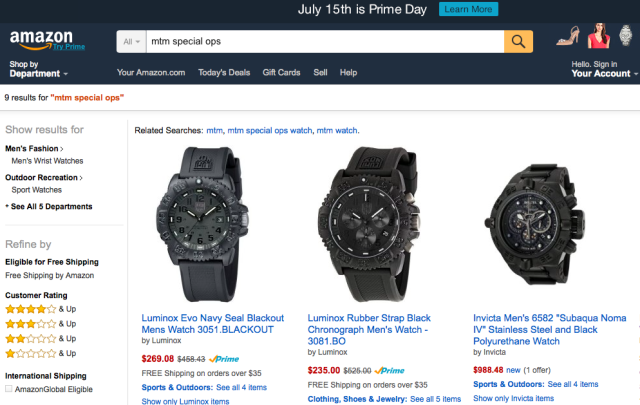
On Monday, a divided panel of appeals judges ruled that Amazon will have to face a trademark lawsuit because of online search results it published, which point to the competitors of a high-end watchmaker.
The US Court of Appeals for the 9th Circuit published its opinion (PDF) in Multi Time Machine v. Amazon.com today, reversing a lower court decision that held in favor of Amazon. In the original case, Multi Time Machine (MTM) sued Amazon saying its search results were confusing. The case now returns to the district court in Los Angeles for further proceedings.
Multi Time Machine may end up being an important outlier in technology law, since it approves a trademark owner bringing suit over search results. Many companies have filed lawsuits challenging the practice of "keyword advertising" by suing competitors or search engines themselves. However, the practice essentially died out because trademark owners couldn't win the lawsuits. Santa Clara University law professor Eric Goldman, who has tracked keyword advertising lawsuits for years, wrote last month that Google and Yahoo had finally prevailed in what he believes was the last remaining keyword advertising lawsuit.
Of those, one of the most notable cases was Rosetta Stone's trademark case against Google, which went to an appeals court and got a muddled ruling before later being settled on confidential terms. So if the Multi Time Machine case ultimately leads to a payment to the plaintiff, it could lead to a new round of trademark litigation focused on retailers rather than search engines.
Currently, Amazon users who search for "MTM Special Ops," a type of watch made by Multi Time Machine, will see a list of watches made by competitors and sold by Amazon. Above the competing products, consumers see the phrase "MTM Special Ops" since it remains in the Amazon search bar into which they type the phrase.
Even if users ultimately knew they weren't buying from MTM, the list of results may cause "initial interest confusion." That would allow MTM to bring a trademark lawsuit, the two-judge majority wrote.
The majority also struck down a separate Amazon defense which held that its use of the MTM mark didn't constitute a "use in commerce" at all.
MTM won't win its case unless it proves Amazon has caused a "likelihood of confusion," but the company should be allowed to make that case to a jury, the judges held.
"A jury could infer that users who are confused by the search result will wonder whether a competitor has acquired MTM or is otherwise affiliated with or approved by MTM," wrote US Circuit Judge Carlos Bea on behalf of the majority.
In dissent, US Circuit Judge Barry Silverman compared Amazon's offering up of competing products to a diner that, when a customer asks for a Coke, explains they serve only Pepsi.
"No reasonably prudent consumer accustomed to shopping online would likely be confused," Silverman wrote.
reader comments
127